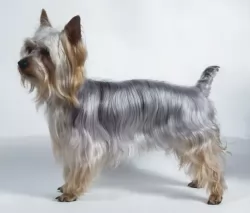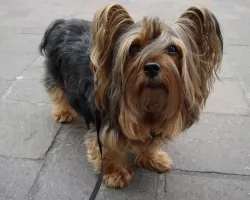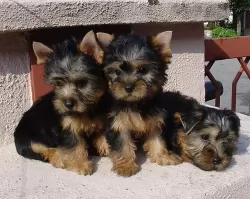 MyDogBreeds
MyDogBreeds Silky Terrier is originated from Australia but American Staffordshire Terrier is originated from United Kingdom. Silky Terrier may grow 22 cm / 8 inches shorter than American Staffordshire Terrier. Silky Terrier may weigh 22 kg / 48 pounds lesser than American Staffordshire Terrier. Both Silky Terrier and American Staffordshire Terrier has almost same life span. Silky Terrier may have less litter size than American Staffordshire Terrier. Silky Terrier requires Moderate maintenance. But American Staffordshire Terrier requires Low maintenance
Silky Terrier is originated from Australia but American Staffordshire Terrier is originated from United Kingdom. Silky Terrier may grow 22 cm / 8 inches shorter than American Staffordshire Terrier. Silky Terrier may weigh 22 kg / 48 pounds lesser than American Staffordshire Terrier. Both Silky Terrier and American Staffordshire Terrier has almost same life span. Silky Terrier may have less litter size than American Staffordshire Terrier. Silky Terrier requires Moderate maintenance. But American Staffordshire Terrier requires Low maintenance
 It is the Yorkshire Terrier and the Australian Terrier which are the ancestors of the Australian Silky Terrier. This is by no means a new dog breed. It is believed that the breed came into existence at the end of the 19th century.
It is the Yorkshire Terrier and the Australian Terrier which are the ancestors of the Australian Silky Terrier. This is by no means a new dog breed. It is believed that the breed came into existence at the end of the 19th century.
The dog’s purpose is to be a companion. This little canine wasn’t always known as the Silky Terrier, but in 1955 the name became officially Silky Terrier.
The breed is also recognized by the Australia National Kennel Council in the Toy Group. In fact the breed is recognised by a number of the major kennel clubs as well as the Fédération Cynologique Internationale.
 The American Staffordshire Terrier is a part of all the confusion surrounding the group of “pit bulls”. The American Staffordshire Terrier is directly related to the English Bull Terrier and English Terrier. The breed of the English Staffordshire Terrier was bred in the early 19th century in the West Midlands. It was not until later that the breed came from Staffordshire. These English Staffordshire Terriers are also the source of contention by breeders who insist it was the Fox Terrier, White English Terrier, Tan and Black Terrier that are the ancestors of the English Staffordshire Terrier.
The American Staffordshire Terrier is a part of all the confusion surrounding the group of “pit bulls”. The American Staffordshire Terrier is directly related to the English Bull Terrier and English Terrier. The breed of the English Staffordshire Terrier was bred in the early 19th century in the West Midlands. It was not until later that the breed came from Staffordshire. These English Staffordshire Terriers are also the source of contention by breeders who insist it was the Fox Terrier, White English Terrier, Tan and Black Terrier that are the ancestors of the English Staffordshire Terrier.
These terriers (AKA pit bull terrier) came to the United States in the mid 1800’s. By the late 1890’s they were accepted by the United Kennel Club (UKC)as the American Pit Bull Terrier – a new and distinct breed. There were also some that were accepted into the AKC as the Staffordshire Terrier. In England they were still known as the American Staffordshire Terrier. When the AKC accepted the breed in 1936 they were given a new standard, new purpose and new group – the terrier. In 1969 the American Kennel Club recognized these dogs as American Staffordshire Terriers and refused to recognize the American Pit Bull Terrier. The name was changed to move the breed away from its characterization as a bull fighter and to distinguish it from the smaller English Staffordshire Terrier. All American Staffordshire Terriers are directly related to the American Pit Bull Terriers.
 This is a small dog breed, standing at just 21 to 26cm in height and weighing in the region of 4 to 5kg. He may be a toy dog, but he is robust and athletic.
This is a small dog breed, standing at just 21 to 26cm in height and weighing in the region of 4 to 5kg. He may be a toy dog, but he is robust and athletic.
The ears of the Silky are small and erect with a lot of silky hair that hangs down and the tail is preferably docked and held high.
His coat is eye-catching – straight, long, silky and shiny. If it is left unclipped, it will reach the floor. The colour of the coat is a tan and silvery grey.
The temperament of any dog is affected by things such as heredity, upbringing and the training and socialization he receives.
Small he may be, but the Silky Terrier can benefit from training as he is feisty and strong willed.
He is energetic and always ready for action. He is ready to come bounding after you and join his human family for any action they’re into. He is playful, bold, loyal, tenacious, independent, social and lively and he makes a good playmate for children.
He might tend to be a bit snappy and aggressive towards other dogs. He is also great as a watchdog, barking and alerting you to strangers.
 The American Staffordshire Terrier is a strong, powerful dog – stocky, muscular and graceful. At one point in time the American Staffordshire Terrier and the American Pit Bull Terrier were considered to be the same breed. Even today there are those that make that argument, but they have been recognized outside the AKC as separate breeds. The AKC only recognizes the American Staffordshire Terrier and not the APBT. However – even though there have been decades of separation in breeding the American Staffordshire Terrier and the American Pit Bull Terrier are the very same dogs genetically.
The American Staffordshire Terrier is a strong, powerful dog – stocky, muscular and graceful. At one point in time the American Staffordshire Terrier and the American Pit Bull Terrier were considered to be the same breed. Even today there are those that make that argument, but they have been recognized outside the AKC as separate breeds. The AKC only recognizes the American Staffordshire Terrier and not the APBT. However – even though there have been decades of separation in breeding the American Staffordshire Terrier and the American Pit Bull Terrier are the very same dogs genetically.
The American Staffordshire Terrier has a broad skull, high set ears and pronounced cheek bones. Their ears should not be cropped by AKC standards and their eyes are far apart, round and dark. With a medium sized muzzle and a heavy muscular back, they are as powerful as they look, if not more so. Most have black noses. The AmStaff has a broad, deep chest with wide set forelegs and compact feet. The tail is short and tapered and it should not be docked.
 The silky terrier is a good choice for those who want a smallish dog but one which is robust and adventurous.
The silky terrier is a good choice for those who want a smallish dog but one which is robust and adventurous.
Your Silky is a loyal dog who loves spending time with his human family, wanting their companionship.
He will need to be physically and mentally stimulated as he is bright and intelligent. He can adapt to life in the city or the countryside but will need to be well exercised wherever he is.
 The American Staffordshire Terrier is a loving, gentle dog that wants nothing more than to be with and please his people. Contrary to his reputation as a “killer”, this dog is actually a lover. They are great with children and want to be a part of the family. They even think they are lap dogs, regardless of their size. They are never going to be aggressive toward people and even though they are not one-person dogs, they are loyal, and they are devoted to the family and the “leader of the pack”.
The American Staffordshire Terrier is a loving, gentle dog that wants nothing more than to be with and please his people. Contrary to his reputation as a “killer”, this dog is actually a lover. They are great with children and want to be a part of the family. They even think they are lap dogs, regardless of their size. They are never going to be aggressive toward people and even though they are not one-person dogs, they are loyal, and they are devoted to the family and the “leader of the pack”.
This breed can tell who is their friend and who is not. They are not aggressive, but they will protect their own. They are courageous, confident, attentive, bold and strong-willed. The AmStaff gets along with other dogs most of the time, but they will never back down from a challenge and should never be left unsupervised with another dog. They should not be loose in a neighborhood or at a dog park. No matter how much you trust your American Staffordshire Terrier they can be killers in any fight with another dog.
In addition to this you must socialize and train your AmStaff. You need to be the pack leader and be in control. The AmStaff wants to please you so for a strong leader they will respond positively to positive training. They are intelligent and pick up quickly on what you want them to do. However, they are incredibly strong physically so training them to heel and walk with you obediently is a must. A well trained and exercised American Staffordshire Terrier is a happy dog and a loyal family dog.
 Just like most other dogs, the Silky Terrier isn’t likely to get sick easily, but he can still succumb to any one of the dog illnesses there are.
Just like most other dogs, the Silky Terrier isn’t likely to get sick easily, but he can still succumb to any one of the dog illnesses there are.
This is when your pet isn’t able to regulate blood sugar levels. Your dog will be drinking a lot more water than usual and also be urinating more often. The vet will explain to you a special diet for your pet and how the disease can be controlled with insulin.
This is a disease seen more often in smaller dogs like the Silky. It is caused by an obstruction in the airway and symptoms can include labored breathing and coughing. Your dog will need to be treated with anti-biotics and possibly surgery.
 For the most part the American Staffordshire Terrier, like most of the “pit bulls” is a hearty, healthy dog. They have a few tendencies that breeders should test for including hip dysplasia, allergies, and heart issues. They can test for Cerebellar ataxia, which has affected the AmStaff with a progressive decline in their ability to control their muscles and coordination.
For the most part the American Staffordshire Terrier, like most of the “pit bulls” is a hearty, healthy dog. They have a few tendencies that breeders should test for including hip dysplasia, allergies, and heart issues. They can test for Cerebellar ataxia, which has affected the AmStaff with a progressive decline in their ability to control their muscles and coordination.
 You can imagine that with that silky hair, you’re going to have to be brushing your furry friend quite a bit. It’s such soft, silky hair that it easily picks up burrs and gets matted. You may want to get your pet to a professional groomer to have the hair cut. As you brush him, check for any unusual lumps and keep an eye on his skin.
You can imagine that with that silky hair, you’re going to have to be brushing your furry friend quite a bit. It’s such soft, silky hair that it easily picks up burrs and gets matted. You may want to get your pet to a professional groomer to have the hair cut. As you brush him, check for any unusual lumps and keep an eye on his skin.
Check your pet’s teeth. Bad teeth can cause bacteria that can affect every part of your dog’s body. Check inside his ears for redness and check his eyes that there is no discharge. Trim the nails. If you don’t have the time or the inclination to do all these things for him, make an appointment with the professional pet groomers who will do it for you.
The Silky Terrier will need quality food if you want him to enjoy a long, healthy life. Its always a good idea to have some of the top quality commercially manufactured dog foods with you for convenience. If you want to give him the best there is, some home-made food will be a good choice, if you keep it simple.
Boiled chicken, brown rice or pasta and spinach, sweet potatoes and carrots are a healthy choice for your pet – plain and simple without any exotic spices that could upset his stomach. Your dog will lap it up and you will see how he loves it. Chop the home-made food up and add some of it into his dry kibble as a treat twice a week.
 feed You can feed your American Staffordshire Terrier either commercially purchased food or food you make yourself if the quality is high, nutrition is good, and the amount eaten is determined by the owner. Do not free feed. The AmStaff has the tendency to become obese. Its ok to use treats for training and rewards, as long as its use is controlled.
feed You can feed your American Staffordshire Terrier either commercially purchased food or food you make yourself if the quality is high, nutrition is good, and the amount eaten is determined by the owner. Do not free feed. The AmStaff has the tendency to become obese. Its ok to use treats for training and rewards, as long as its use is controlled.
As previously mentioned the American AmStaff Terrier has a tendency toward a few health issues. Hip Dysplasia – this condition causes a lot of pain and disability. It leads to different types of arthritis and degenerative joint disease. Cardiac Issues – Congenital heart disease consists of vessel malformation and lesions.
The AmStaff can be susceptible to Autoimmune Thyroiditis. This is a form of hypothyroidism developed by dogs. It is usually seen between 2 and 5 years of age. Continual retesting is recommended.
This is the most dangerous disease possibility that the American Staffordshire Terrier faces. There is a test for this condition which causes the AmStaff to display an inability to control their muscles and a loss of balance, to the point of falling. This is a progressive disease that often leads to euthanasia. The Staffordshire Terrier Club of America suggests that AmStaffs carrying the NCL genes should never be bred.
The American Staffordshire Terrier is an energetic, and athletic dog that loves to play and needs plenty of exercise. This breed is oriented to people and should never be left alone in the yard all day as a way for her to exercise. She needs you to play with her. If you cannot do this, then you should not own this breed of dog. This breed also loves to play canine sports. They thrive on games like dock diving, agility and obedience competitions. They excel at search and rescue. These are competitive dogs that want nothing more then to please their people.